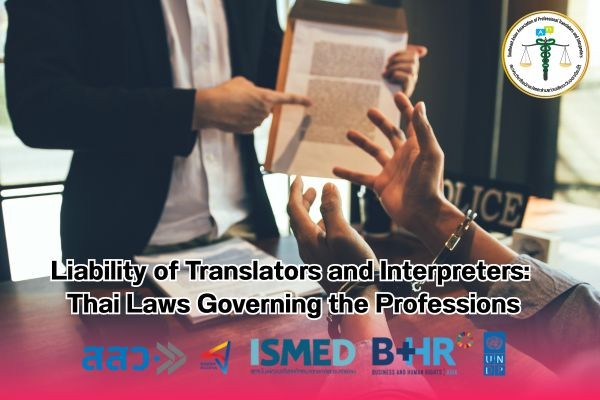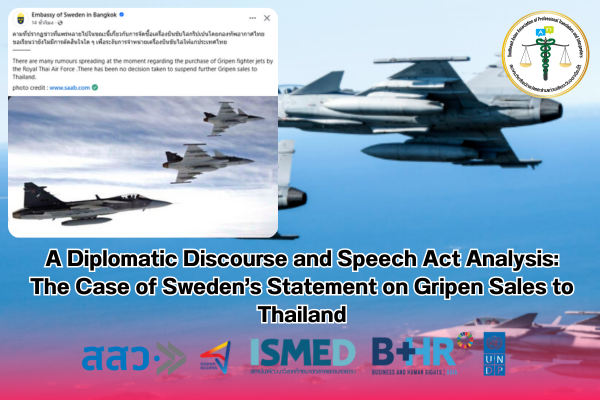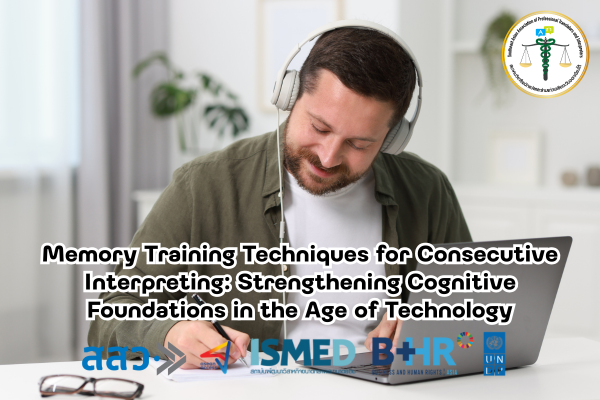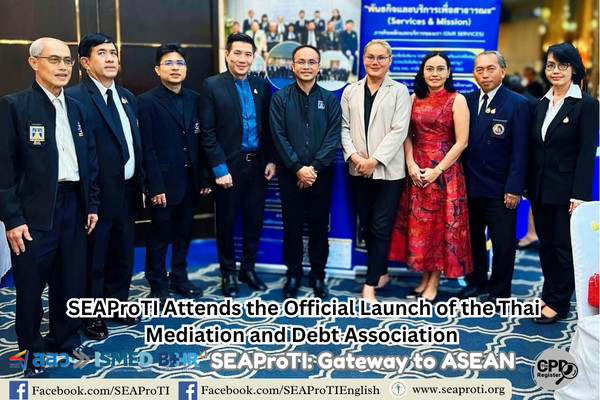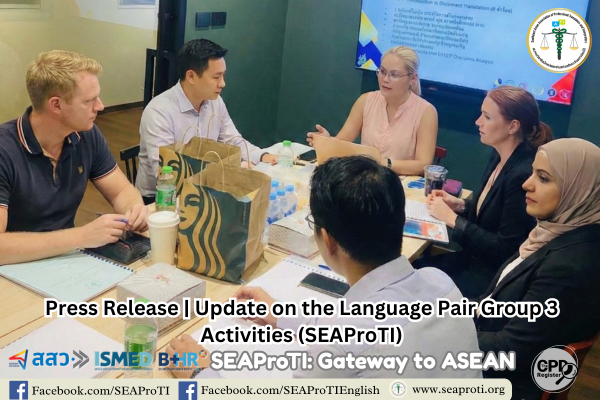Liability of Translators and Interpreters: Thai Laws Governing the Professions
6 September 2025, Bangkok – The translation and interpreting professions in Thailand, despite their crucial role in justice, healthcare, and business, remain outside the scope of a dedicated statute that clearly regulates qualifications and liabilities. Unlike professions such as medicine, law, or engineering—which require registration and licensing from professional bodies—translators and interpreters are not subject to a statutory licensing regime. Nevertheless, certain laws, such as the Civil Procedure Code and the Criminal Procedure Code, stipulate provisions regarding translated documents and the role of interpreters in judicial proceedings. These reflect the principles of the rule of law and the right to equal access to justice (Orphan, 2012).
1. Relevant Laws
1.1 Civil Procedure Code, Section 46
- Paragraph 3: If foreign-language documents are submitted to the court, the party must provide a certified Thai translation.
- Paragraph 4: If a party or any person appearing before the court cannot understand Thai, the court must order an interpreter to be provided.
1.2 Criminal Procedure Code, Section 13
Investigations, preliminary hearings, and trials must be conducted in Thai.
- If a party or witness does not understand Thai, the court or investigating officers must provide an interpreter.
- If the person is disabled in communication (e.g., deaf or mute), a sign-language interpreter or alternative means of communication must be provided.
- Interpreters must take an oath or affirmation to translate faithfully, without addition or omission.
2. Examples of Translator and Interpreter Errors
2.1 Translators
- Medical documents: Mislabeling of prosthetic parts led to patient harm (Fakler et al., as cited in Karwacka, 2014).
- Technical manuals: Confusion between “steam” and “smoke” caused machinery misuse and physical injury.
- Legal documents: Misinterpretation of an insurance clause shifted obligations from the landlord to the tenant.
- Textbooks: A mistranslated Japanese textbook was published with systemic errors, forcing recalls and reputational damage.
2.2 Interpreters
- Medical interpreting: Misinterpretation of the Spanish term intoxicado (dizzy) as “intoxicated” led to a stroke misdiagnosis (Flores et al., 2014).
- Court interpreting: Misinterpretation of testimony disadvantaged the defendant.
- General interpreting: A mistranslated address during an emergency call delayed rescue, leading to brain death of the patient.
3. Liability under Contract for Work
Although Thailand does not yet have a specific professional statute regulating translators and interpreters, their relationship with clients falls under the Civil and Commercial Code, Section 587 (Contract for Work).
Key features of a translation contract:
- Two contracting parties: client and translator/interpreter.
- Objective: The translator/interpreter must complete the work successfully.
- Remuneration: the client must pay a fee (translation/interpreting fee) as consideration.
If a translator or interpreter commits errors causing damages, liability arises under contract law and may extend to tort liability (Section 420).
4. Comparison Table: General Translators vs. Professional Translators (SEAProTI Certified)
| Aspect | General Translators/Interpreters | Professional Translators/Interpreters (e.g., SEAProTI Certified) |
|---|---|---|
| Legal Status | No clear statutory registration | Certified through formal examination and registration |
| Contractual Liability | Liable under general contract and tort law | Same, but with additional oversight from the Association |
| Ethical Responsibility | No central body to enforce ethics | Bound by professional ethics; subject to disciplinary review |
| Sanctions | May be sued under civil/criminal law | In addition to legal liability, one may face revocation of a professional license |
| Assurance for Employers | No formal guarantees; employers face risks | Highest assurance: errors lead to revocation of certification, protecting clients |
Conclusion
Although Thailand lacks a dedicated statute regulating translators and interpreters, general laws such as the Civil Procedure Code, the Criminal Procedure Code, and the Civil and Commercial Code establish a framework of liabilities. The key distinction lies with certified professionals under organizations such as SEAProTI: they are held to higher standards, and misconduct may result not only in civil, criminal, or contractual liability but also in revocation of professional licenses. This system provides stronger protection for employers and reinforces professional credibility at both national and international levels.
References
- Civil and Commercial Code [CCC]. (1925). Royal Gazette, Vol. 42, Part 80 K, pp. 1–194.
- Civil Procedure Code [CPC]. (1934). Royal Gazette, Vol. 51, Part 0 K, pp. 1–124.
- Criminal Procedure Code [CrPC]. (1934). Royal Gazette, Vol. 51, Part 0 K, pp. 1–87.
- Royal Gazette. (1997). Ministerial Regulation of the Ministry of Interior B.E. 2540 on Translation Certification. Vol. 114, Part 9 K.
- Fakler, J. K., et al. (2014). [Original study on medical translation errors]. As cited in Karwacka, W. (2014). Medical translation: A risky activity. Linguistica Silesiana, 35(1), 113–125.
- Flores, G., Abreu, M., Barone, C. P., Bachur, R., & Lin, H. (2012). Errors of medical interpretation and their potential clinical consequences: A comparison of professional versus ad hoc versus no interpreters. Annals of Emergency Medicine, 60(5), 545–553. https://doi.org/10.1016/j.annemergmed.2012.01.025
- Karwacka, W. (2014). Medical translation: A risky activity. Linguistica Silesiana, 35(1), 113–125.
- Orphan, A. (2012). The Rule of Law and the Thai Justice Process. Bangkok: Thammasat University Press.
About Certified Translators, Translation Certification Providers, and Certified Interpreters of SEAProTI
- The Southeast Asian Association of Professional Translators and Interpreters (SEAProTI) has officially announced the criteria and qualifications for registration of Certified Translators, Translation Certification Providers, and Certified Interpreters under Sections 9 and 10 in the Royal Gazette, Office of the Cabinet Secretariat, Office of the Prime Minister, Kingdom of Thailand, dated 25 July 2024, Vol. 141, Part 66 Ng, p. 100. Certified Translators, Translation Certification Providers, and Certified Interpreters
- The Office of the Council of State has proposed a Royal Decree allowing registered translators—including those certified by professional associations or language institutes with training and registration systems—to certify translations (Letter to SEAProTI dated April 28, 2025)
- SEAProTI is the first professional association in Thailand and Southeast Asia to establish a comprehensive certification system for translators, translation certification providers, and interpreters.
Headquarters: Baan Ratchakru Building, Room 402, No. 33 Soi Phaholyothin 5, Phaholyothin Road, Phayathai District, Bangkok 10400, Thailand.
Email: hello@seaproti.com
Tel: (+66) 2-114-3128 (Office hours: Monday–Friday, 09:00–17:00)
ความรับผิดของนักแปลและล่าม: กฎหมายไทยที่เกี่ยวข้องกับการประกอบอาชีพนักแปลและล่าม
6 กันยายน 2568, กรุงเทพมหานคร – การประกอบอาชีพนักแปลและล่ามในประเทศไทย แม้จะเป็นอาชีพที่มีบทบาทสำคัญในกระบวนการยุติธรรม สาธารณสุข และธุรกิจ แต่กฎหมายไทยยังไม่ได้มีการตรากฎหมายเฉพาะที่ควบคุมหรือกำหนดคุณสมบัติและความรับผิดอย่างชัดเจน แตกต่างจากวิชาชีพอื่น เช่น แพทย์ ทนายความ หรือวิศวกร ที่ต้องขึ้นทะเบียนและได้รับใบอนุญาตจากองค์กรควบคุมวิชาชีพ อย่างไรก็ดี กฎหมายบางฉบับ เช่น ประมวลกฎหมายวิธีพิจารณาความแพ่ง และ ประมวลกฎหมายวิธีพิจารณาความอาญา ได้กำหนดหลักเกณฑ์บางประการที่เกี่ยวข้องกับการใช้เอกสารแปลและบทบาทของล่ามในกระบวนการยุติธรรม ซึ่งสะท้อนถึงหลักนิติธรรมและสิทธิในการเข้าถึงความยุติธรรมอย่างเสมอภาค (อรพันธุ์, 2555)
1. กฎหมายที่เกี่ยวข้อง
1.1 ประมวลกฎหมายวิธีพิจารณาความแพ่ง มาตรา 46
- วรรค 3: หากมีการยื่นเอกสารภาษาต่างประเทศต่อศาล คู่ความต้องจัดทำคำแปลเป็นภาษาไทย พร้อมคำรับรอง
- วรรค 4: หากคู่ความหรือบุคคลที่มาศาลไม่เข้าใจภาษาไทย ศาลกำหนดให้จัดหาล่าม
1.2 ประมวลกฎหมายวิธีพิจารณาความอาญา มาตรา 13
- กำหนดให้การสอบสวน ไต่สวน หรือพิจารณาคดีใช้ภาษาไทย
- หากคู่ความหรือพยานไม่เข้าใจภาษาไทย ศาลหรือพนักงานสอบสวนต้องจัดหาล่าม
- หากเป็นผู้พิการทางการสื่อสาร เช่น หูหนวกหรือเป็นใบ้ ต้องมีล่ามภาษามือ
- ล่ามต้องสาบานหรือปฏิญาณตนว่าจะทำหน้าที่โดยสุจริต ไม่ตัดทอนหรือเพิ่มเติมสิ่งที่แปล
2. ตัวอย่างความผิดพลาดของนักแปลและล่าม
2.1 นักแปล
- เอกสารการแพทย์: แปลผิดประเภทอวัยวะเทียม ทำให้ผู้ป่วยได้รับอันตราย (Fakler et al., อ้างใน Wioleta, 2014)
- เอกสารเทคนิค: แปลคำว่า “ไอน้ำ” เป็น “ควัน” ทำให้ผู้ใช้เครื่องจักรเข้าใจผิดจนเกิดอันตราย
- เอกสารกฎหมาย: แปลหน้าที่ในสัญญาประกันภัยผิด ฝ่ายที่ต้องรับผิดชอบเปลี่ยนไป
- ตำราเรียน: แปลผิดทั้งเล่ม ทำให้สำนักพิมพ์เสียชื่อเสียงและต้องเรียกคืนหนังสือ
2.2 ล่าม
- ล่ามการแพทย์: เข้าใจผิดระหว่าง “intoxicado” (วิงเวียน) กับ “intoxicated” (เมา) ทำให้ผู้ป่วยรักษาผิดวิธี (Flores et al., 2014)
- ล่ามในศาล: แปลคำให้การผิดจนจำเลยเสียเปรียบ
- ล่ามทั่วไป: แปลเลขที่อยู่ผิด ทำให้ผู้ป่วยหัวใจหยุดเต้นไม่ได้รับการช่วยเหลือทันเวลา
3. ความรับผิดตามสัญญาจ้างทำของ
แม้จะยังไม่มีกฎหมายควบคุมวิชาชีพนักแปลและล่ามโดยตรง แต่ความสัมพันธ์ระหว่างผู้ว่าจ้างและนักแปลอยู่ภายใต้ ประมวลกฎหมายแพ่งและพาณิชย์ มาตรา 587 ว่าด้วยสัญญาจ้างทำของ
ลักษณะสำคัญของสัญญาจ้างแปล:
- เป็นสัญญาที่มีคู่สัญญาสองฝ่าย (ผู้ว่าจ้าง–ผู้รับจ้าง)
- มีวัตถุประสงค์เพื่อให้นักแปล/ล่ามทำงานจนเสร็จสมบูรณ์
- ผู้ว่าจ้างต้องชำระสินจ้าง (ค่าแปล/ค่าล่าม) เป็นการตอบแทน
หากนักแปลหรือ ล่ามทำงานผิดพลาดจนเกิดความเสียหาย ย่อมเข้าข่ายความรับผิดทางสัญญา และอาจรวมถึงความรับผิดทางละเมิด (มาตรา 420)
4. ตารางสรุป “นักแปลทั่วไป vs. นักแปลวิชาชีพ”
| ประเด็น | นักแปล/ล่ามทั่วไป | นักแปล/ล่ามวิชาชีพ (เช่น SEAProTI Certified) |
|---|---|---|
| สถานะทางกฎหมาย | ไม่มีระบบขึ้นทะเบียนชัดเจน | มีการสอบ รับรอง และขึ้นทะเบียนอย่างเป็นทางการ |
| ความรับผิดทางสัญญา | รับผิดตามสัญญาจ้างทำของและละเมิดทั่วไป | เช่นเดียวกัน แต่มีมาตรการควบคุมเพิ่มเติมจากสมาคม |
| ความรับผิดทางจริยธรรม | ไม่มีองค์กรกลางกำกับ | ถูกกำกับโดยจรรยาบรรณวิชาชีพ หากผิดพลาดถูกสอบสวนและลงโทษ |
| มาตรการลงโทษ | อาจถูกฟ้องแพ่ง–อาญาตามกฎหมายทั่วไป | นอกจากความรับผิดทางกฎหมายแล้ว ยังถูก เพิกถอนใบอนุญาตวิชาชีพ |
| หลักประกันต่อนายจ้าง | ไม่ชัดเจน นายจ้างเสี่ยงหากเกิดความผิดพลาด | การันตีคุณภาพและมาตรฐานสูงสุด หากทำผิดจริง สมาคมจะเพิกถอนสิทธิ์ทันที |
บทสรุป
แม้ประเทศไทยยังไม่มีกฎหมายเฉพาะควบคุมวิชาชีพนักแปลและล่าม แต่กฎหมายทั่วไป เช่น ประมวลกฎหมายวิธีพิจารณาความแพ่ง ประมวลกฎหมายวิธีพิจารณาความอาญา และประมวลกฎหมายแพ่งและพาณิชย์ ได้กำหนดกรอบความรับผิดที่สามารถนำมาปรับใช้ได้ อย่างไรก็ตาม ความแตกต่างที่สำคัญคือ นักแปลและล่ามที่ได้รับการรับรองจากองค์กรวิชาชีพ เช่น SEAProTI ต้องปฏิบัติตามมาตรฐานสูงกว่า และหากทำผิด ย่อมเผชิญการลงโทษที่เข้มข้นกว่า รวมถึงการเพิกถอนใบอนุญาตวิชาชีพ อันเป็นกลไกคุ้มครองผู้ว่าจ้างและสร้างความน่าเชื่อถือในระดับสากล
เอกสารอ้างอิง (References)
- ประมวลกฎหมายแพ่งและพาณิชย์ [Civil and Commercial Code]. (พ.ศ. 2468). ราชกิจจานุเบกษา, เล่ม 42, ตอนที่ 80 ก, หน้า 1–194.
- ประมวลกฎหมายวิธีพิจารณาความแพ่ง [Civil Procedure Code]. (พ.ศ. 2477). ราชกิจจานุเบกษา, เล่ม 51, ตอนที่ 0 ก, หน้า 1–124.
- ประมวลกฎหมายวิธีพิจารณาความอาญา [Criminal Procedure Code]. (พ.ศ. 2477). ราชกิจจานุเบกษา, เล่ม 51, ตอนที่ 0 ก, หน้า 1–87.
เกี่ยวกับนักแปลรับรอง ผู้รับรองการแปล และล่ามรับรองของสมาคมวิชาชีพนักแปลและล่ามแห่งเอเชียตะวันออกเฉียงใต้
- สมาคมวิชาชีพนักแปลและล่ามแห่งเอเชียตะวันออกเฉียงใต้ (SEAProTI) ได้ประกาศหลักเกณฑ์และคุณสมบัติผู้ที่ขึ้นทะเบียนเป็น “นักแปลรับรอง (Certified Translators) และผู้รับรองการแปล (Translation Certification Providers) และล่ามรับรอง (Certified Interpreters)” ของสมาคม หมวดที่ 9 และหมวดที่ 10 ในราชกิจจานุเบกษา ของสำนักเลขาธิการคณะรัฐมนตรี ในสำนักนายกรัฐมนตรี แห่งราชอาณาจักรไทย ลงวันที่ 25 ก.ค. 2567 เล่มที่ 141 ตอนที่ 66 ง หน้า 100 อ่านฉบับเต็มได้ที่: นักแปลรับรอง ผู้รับรองการแปล และล่ามรับรอง
- สำนักคณะกรรมการกฤษฎีกาเสนอให้ตราเป็นพระราชกฤษฎีกา โดยกำหนดให้นักแปลที่ขึ้นทะเบียน รวมถึงผู้รับรองการแปลจากสมาคมวิชาชีพหรือสถาบันสอนภาษาที่มีการอบรมและขึ้นทะเบียน สามารถรับรองคำแปลได้ (จดหมายถึงสมาคม SEAProTI ลงวันที่ 28 เม.ย. 2568)
- สมาคมวิชาชีพนักแปลและล่ามแห่งเอเชียตะวันออกเฉียงใต้ เป็นสมาคมวิชาชีพแห่งแรกในประเทศไทยและภูมิภาคเอเชียตะวันออกเฉียงใต้ที่มีระบบรับรองนักแปลรับรอง ผู้รับรองการแปล และล่ามรับรอง
สำนักงานใหญ่: อาคารบ้านราชครู เลขที่ 33 ห้อง 402 ซอยพหลโยธิน 5 ถนนพหลโยธิน แขวงพญาไท เขตพญาไท กรุงเทพมหานคร 10400 ประเทศไทย
อีเมล: hello@seaproti.com โทรศัพท์: (+66) 2-114-3128 (เวลาทำการ: วันจันทร์–วันศุกร์ เวลา 09.00–17.00 น.)


